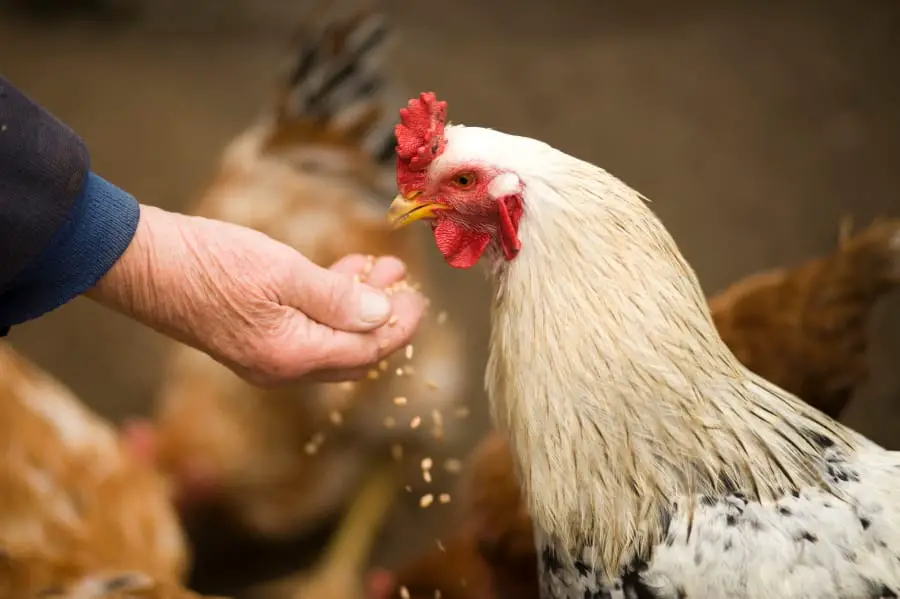
Living on a farm or out in the country can be a great lifestyle choice. If you are thinking about adding animals to your farm, make sure you are doing all of the research you can. If you are looking into raising both chickens and ducks, it’s important to know if they can eat the same foods, or if they should separate while eating.
Can chickens and ducks share the same food? As adults, chickens and ducks can eat the same foods as long as they are unmedicated. However, when they are young, you do not want to feed them the same feed.
If you are looking for more information about feeding ducks and chickens, keep reading. We will break down exactly what each breed can and can’t eat, and how you can feed them together.
Can Chickens and Ducks Share the Same Food?
Chickens and ducks can live together and eat the same feed. However, there is some critical information regarding ducks and chickens living together and eating the same foods that you should know, according to Hobby Farms.
Watch the Protein
Too much protein in your feed can cause issues for your ducks.
- It can cause ducks to grow faster than usual, resulting in developmental problems.
- It can cause leg and foot problems, which could cause your duck to have issues walking.
- Ducks could also develop a condition called angel wing, a condition that causes the duck’s wings to curve away from their bodies.
Most ducks that live domestically won’t have to worry too much since they can’t fly anyway, but ducks in the wild with angel wing issues wouldn’t be able to fly, which could put them in danger from predators.
Is the Feed Medicated?
When ducklings are young, and you feed them alongside chickens, make sure you are watching the type of feed you are using. Ducks don’t need medicated feed, as some chickens do. If you are going to feed them together, try a non-medicated starter feed such as the highly recommended Manna Pro Non-Medicated Start Crumble Feed for Chicks and Ducklings (click link to see on Amazon).
Chickens can get coccidiosis when they are baby chicks, and medicated feed can help keep them from getting it. If you must use medicated feed for your baby chicks, like Manna Pro Chick Starter Medicated with Amprolium, you must make sure you are keeping the ducklings and chicks separated until they are adults.
You should only keep your ducklings on chick starter feed for the first couple weeks of their lives, but chickens need to be on this type of feed for up to eight weeks. So overall, it’s best to keep them separated until they are adults to ensure you are getting them the correct amount of feed and the right type of feed that they need to grow.
Feeding Your Ducks
When it comes to feeding your ducks, you want to make sure you are feeding them things that will help keep them healthy and avoid foods that could make them sick. Ducks love fruits and vegetables, but you need to make sure you are careful.
According to the RSPCA, here are the safe fruits and vegetables you can feed a duck:
- Zucchini
- Peas
- Leafy greens
- Corn
- Veggie peels
- Non-citrus fruits
Pro-Tip: Don’t forget about the worms! It might sound gross, but ducks love a fresh juicy worm to eat!
You are going to want to avoid feeing your duck these foods:
- Bread
- Popcorn
- Chocolate
- Onions
- Garlic
- Avocado
- Citrus fruits
You may think that bread is a safe food for your ducks, and it can be in moderation, but when you feed a duck large amounts of bread, it can be more harmful to your duck than good. You should only give a duck bread on special occasions and use it more as a treat than a daily option for food.
Feeding Your Chickens
Chickens love to eat, and they are continually looking around for something to peck on. There are some foods that they can eat that would affect the eggs that they produce.
According to Purina Mills, the following foods are safe for chickens:
- Lettuce
- Beets
- Broccoli
- Carrots
- Kale
- Squash
- Pumpkins
- Cucumbers
They also love eating flowers. If you have your chickens’ free-range and having a lovely flower garden, keep an eye on your plants! They love specific types of flowers, such as daisies and roses.
You are going to want to avoid certain types of foods that can cause the eggs to taste bad, but also foods that can be toxic to your chickens.
Some things to avoid feeding your chickens are:
- Onions
- Garlic
- Avocado pits and skins
- Dried beans or undercooked beans
- Rhubarb
It’s also safe to say that you don’t want to feed your chicken anything moldy, rotten, or salty. It’s best to stay away from those types of foods for most animals. If you are going to be feeding your chickens anything other than feed, make sure you are giving them foods that will be healthy for them and not harmful.
The Best Feed for Your Flock
When it comes to feeding your flock, you want the best feed on the market. It’s essential to read all information regarding exactly which flocks you can give that specific feed to, or you could be giving them something that could be harmful. There is a large variety of feed available for any situation or need that arises with your flock.
Here are our recommendations for the best feed:
Mana Pro All Flock Crumble
If you are looking for something that will be perfect for a large flock of mixed birds, then the Mana Pro All-Star Flock Crumble with Probiotics would be an ideal choice.
- This works well for mixed flocks such as chickens, ducks, geese, turkeys, and game birds
- Added probiotics to help aid in digestion
- Vitamins and minerals for balanced diets
- No artificial colors or flavors
Purina Premium Poultry Feed
When you are thinking about starting a mixed flock, the Purina Premium Poultry Feed Flock Raiser Pellets is a good choice. It is used when the flock is young and starting. It is the perfect starter feed.
- Perfect for mixed flocks with chicks, ducklings, turkeys, and geese
- Essential amino acids
- Great for digestive health
- A good feed for muscle and skeletal development
Fresh Eggs Daily Poultry Probiotics
Are you looking to help aid in the production of the eggs your ducks or chickens lay? You can give your flock the Fresh Eggs Daily Poultry Probiotics Chicken and Duck Feed Supplements to provide them with the boost they need to produce eggs.
- Works for both chickens and ducks
- Helps egg production
- Natural probiotics
- Helps digestion
Verm- X Natural Support of Intestinal Health
If your flock needs a little intestinal help, then Verm- X Natural Support of Intestinal Health is the way to go. You can feed this to your mixed flock to help get their digestion back on track.
- Works for chickens, ducks, geese, and turkeys of all ages
- Natural herbal pellets
- Vets recommend this product
- You can eat any eggs produced while the flock is on this feed
In Conclusion
If you are going to put your chickens and ducks in the same common area, make sure you are following our guidelines to ensure you are doing it safely for both animals. You are going to want to make sure you are feeding them separately while they are ducklings and chicks.
Ducks and chickens can get along great if they grow up together, and many people do allow their ducks and chickens to live and eat together.


